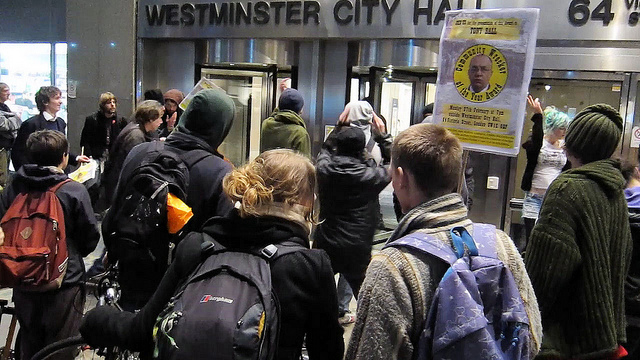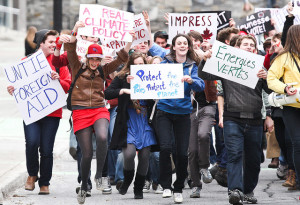To increase young people’s participation in local elections, young people’s issues need to be on the agenda
Democratic Audit has suggested young people can be encouraged to participate in elections if voting procedures are changed and much better sources of information are available online. In this post Councillor Rowan Draper explores other ways to involve young people in the upcoming local elections, arguing that citizenship education should be enhanced and that politicians, parties and local authorities need to change the way they address young people’s issues.

Where do young people’s concerns feature on the local government agenda? Credit: Alan Stanton, CC BY-SA 2.0
The Guardian recently asked, How can we get young people excited about local elections? on their Local Leaders Network. Anthony Zacharzewski of the Democratic Society argued that young people in France vote more regularly than the British (64% to 38%) whilst our young people are involved in politics they are not involved in voting. Democratic Audit’s Richard Berry argued that more online resources would help young people access the information they want at the time they want it, in time for the election.
Local elections very rarely receive the same turnout that a parliamentary election does but since the 1970s General Election turnout has steadily declined, as well as political party membership, perhaps this in part down to the stakes perceived by the electorate? Yet IPSOS-Mori found in 2013 that “eight in 10 (79%) say they trust their local council to make the important decisions, compared to just one in 10 (11%) who trust the government to.” They also found that only eight per cent do not trust either. So why do local communities trust local government more but vote for central government in higher numbers?
One answer could be the focus that our national politics enjoys from the mainstream press. If you buy any national newspaper: The Mirror, The Times, The Guardian or Telegraph you will likely find a wealth of current stories about what is happening in Westminster, focusing on the minutiae of politics, scrutinising politicians of all parties whereas can the same be said for the local press? Speaking from my own experience on Stafford Borough Council, and those around me, most note that local press only come to report on council meetings when there is something important to write about. The Independent’s ‘Decline and fall of the local press‘ acknowledged that local papers were finding it difficult to compete with the internet as social networking sites like Twitter have allowed politicians, journalists, and citizen bloggers to miss out the middle man and report news to interested parties directly.
Another answer could lie within the complexity of local government: how many regular voters understand the differences between local government authorities: districts, counties, metropolitan boroughs, unitaries? On the doorstep sometimes you can explain the differences by saying “We do bins, leisure and council tax benefits and the County Council does roads, education and social care” but is that enough?
Locally, they will likely know which party is in control of the council and how regular the elections are (if their council elects by thirds) but they’ll be less likely to know who is the Chair of X committee or the Chief Whip of X Group, in direct contrast to Parliament where at a click of a mouse or tap on a tablet you can find out both.
National press have given particular focus to individuals like Graham Stuart MP (Chair of the Education Select Committee), Keith Vaz MP (Chair of the Home Affairs Committee) and Margaret Hodge MP (Chair of the Public Accounts Committee) when particular issues have reached their height, and so for ease of engagement people will see the TV and are more likely to be familiar with parliamentarians than they are local councillors.
Part of how we begin to address this for young people, in my opinion, is to ensure that citizenship education is delivering at an early age the lessons of the differences between the tiers of local government authorities. How many schools invite local councillors to their lessons to help learn about the differences? How many councils have an education programme that seeks to actively engage young people and educate them on what they do? Does the Council’s administration, political or otherwise, see it as an imperative to their agenda? In this time of austerity: Councils are looking at all options to save money and with many authorities cutting youth service budgets, like my own County authority, do they believe that it is a priority?
Another part of how we address this is looking at the skills of councillors. Are they relevant to engage with young people? At my own council around 25% have Twitter accounts, but less than that are actually active, and that’s likely the only social media engagement they do. You’ve got to go where the people are: whether that’s on the doorstep, at the local coffee morning, at your local surgery, or online. How many councils provide training for elected members to learn these skills or place importance on members engaging with residents online? If your Council isn’t talking about the Networked Councillor project, you’ve got to ask are you doing enough?
When local parties are campaigning: do they consider young people relevant, and what is there to show to young people that they are a priority? What’s in the manifesto that says “we’re interested and care about what you want?” Local government politicians cannot expect voters to come out and vote if there’s nothing in it for them. For that to happen you need people to champion the rights and aspirations of young people: and sometimes the only way to achieve that is to have young people on the council. Young councillors, as role-models, are able to bridge the gap but they need support from their colleagues to carry it through.
To increase turnout from young people in local government elections the answer is simple: young people have got to be on the agenda. How you convince them of that is up to each local authority and each local political party, and perhaps therein lies another problem: each of our experiences differs from the area we live and the politics around our local community. There are some really good examples of what can be done and how they’ve gone about it but for every good example there’s another example of an area that’s not interested in listening or doesn’t see it as a priority.
For young people to be excited about local elections they have to be treated like a voter group that councils and political groups need. Some may want to take a direct role in influencing their local council or political party by lobbying their local council, others may want to organise to get more young councillors elected, and others will just say what’s the point and will stay at home. What’s clear is that councils and politicians, across the country, need to take a pro-active approach to this and the longer it is left the worse it will become.
Local government, thanks to government cuts, is changing rapidly and this provides us elected representatives an opportunity to do things differently. Councillors will often say this when they want to cut budgets but how many of them actively look at their own work and apply that mantra? Having a working party or committee could be one way to ensure that the council keeps on top of the skills and needs of their membership, and they could consult with young people (and any other voter group) directly on the abilities they feel their elected councillor needs to be effective and successful for all of the community.
—
Note: This post was originally published on Rowan Draper’s blog. It represents the views of the author and does not give the position of LSE or Democratic Audit. Please read our comments policy before responding. Shortlink for this post: buff.ly/1ikb8TO
—
 Rowan Draper is the Labour Councillor for Littleworth on Stafford Brorough Council. He was elected in May 2011 at the age of 26, and in January 2014 was shortlisted for the Local Government Information Unit’s Young Councillor of the Year award. He tweets on @Rowan_Draper.
Rowan Draper is the Labour Councillor for Littleworth on Stafford Brorough Council. He was elected in May 2011 at the age of 26, and in January 2014 was shortlisted for the Local Government Information Unit’s Young Councillor of the Year award. He tweets on @Rowan_Draper.






 Democratic Audit's core funding is provided by the Joseph Rowntree Charitable Trust. Additional funding is provided by the London School of Economics.
Democratic Audit's core funding is provided by the Joseph Rowntree Charitable Trust. Additional funding is provided by the London School of Economics.
Are parties putting anything in their local election manifestos for young people? https://t.co/mtMBmWYyyD
To increase young people’s participation in local elections, young people’s issues need to be on the agenda: https://t.co/mSXq6L9xN3
A #VotesAt16 referendum could help stimulate a much-needed conversation about youth and disengagement https://t.co/6AqJbm0m5F by @craigpberry
To increase young people’s participation in elections young people’s issues need to be on the agenda @democraticaudit https://t.co/UciOtZMOhp
New from Stafford councillor @Rowan_Draper on Democratic Audit: what the parties need to do to engage young voters https://t.co/DCXJc2nVks
To increase young people’s participation in local elections, young people’s issues need to be on the agenda https://t.co/cbyaaYH1YN
To increase young people’s participation in local elections, young people’s issues need to be on the agenda https://t.co/pqVxwD1gmj